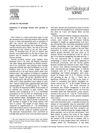TLDR Probiotics may help reduce stress-related skin issues and improve hair growth.
The document explored the concept of a "gut-brain-skin axis," suggesting a link between gastrointestinal health, psychological stress, and skin conditions. It proposed that stress could affect gut microbiota, influencing skin health and exacerbating conditions like acne. The study used a mouse model to show that probiotics, specifically Lactobacillus reuteri, could reduce stress-induced skin inflammation and hair growth inhibition, indicating that probiotics might modulate immune responses and improve skin health. The authors highlighted the interconnectedness of the nervous, endocrine, and immune systems and suggested that probiotics could maintain microbiota balance, potentially preventing excessive inflammation and disease onset. Further research was deemed necessary to understand these interactions and their implications for treating skin disorders.
 66 citations
,
July 2007 in “Journal of Molecular Medicine”
66 citations
,
July 2007 in “Journal of Molecular Medicine” Stress increases certain chemicals in the skin and nerves, which might worsen skin conditions.
 375 citations
,
July 2006 in “Journal of Investigative Dermatology”
375 citations
,
July 2006 in “Journal of Investigative Dermatology” Stress can worsen skin and hair conditions by affecting the skin's immune response and hormone levels.
 293 citations
,
November 2005 in “Trends in Immunology”
293 citations
,
November 2005 in “Trends in Immunology” Stress can worsen skin conditions and stop hair growth by affecting the body's stress response system.
 108 citations
,
July 2004 in “American Journal of Pathology”
108 citations
,
July 2004 in “American Journal of Pathology” Stress increases a factor in mice that leads to hair loss, and blocking this factor may prevent it.
 194 citations
,
March 2003 in “American Journal of Pathology”
194 citations
,
March 2003 in “American Journal of Pathology” Stress stops hair growth in mice by causing early hair growth phase end and harmful inflammation through a specific nerve-related pathway.
38 citations
,
July 2020 in “EMBO journal” SIRT7 protein is crucial for starting hair growth in mice.
 August 2014 in “Journal of clinical & experimental dermatology research”
August 2014 in “Journal of clinical & experimental dermatology research” Platelet-released growth factors can treat hair loss by activating hair follicle stem cells, blocking certain pathways, and controlling inflammation and fibrosis.
 36 citations
,
June 2009 in “Nanomedicine”
36 citations
,
June 2009 in “Nanomedicine” Fullerene nanomaterials help hair grow faster and increase hair follicles.
 8 citations
,
September 2003 in “Journal of dermatological science”
8 citations
,
September 2003 in “Journal of dermatological science” Substance P helps hair grow longer and faster.
 236 citations
,
July 2001 in “Trends in Molecular Medicine”
236 citations
,
July 2001 in “Trends in Molecular Medicine” Future hair loss treatments should aim to extend hair growth, reactivate resting follicles, reverse shrinkage, and possibly create new follicles, with gene therapy showing promise.








